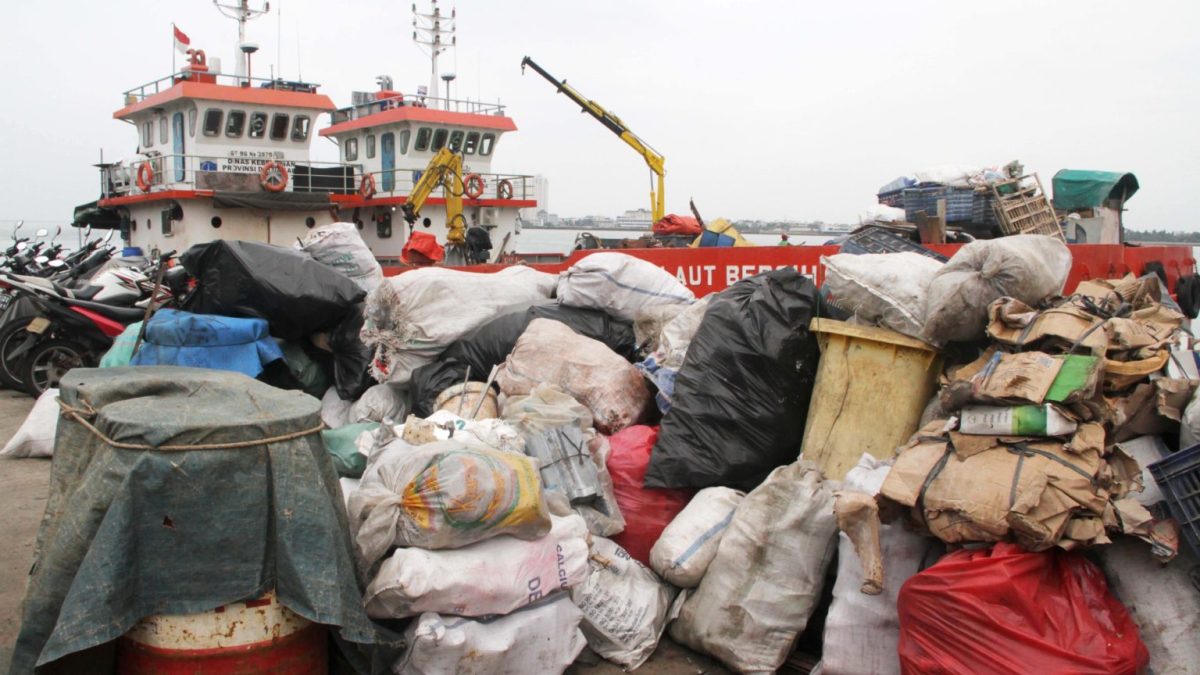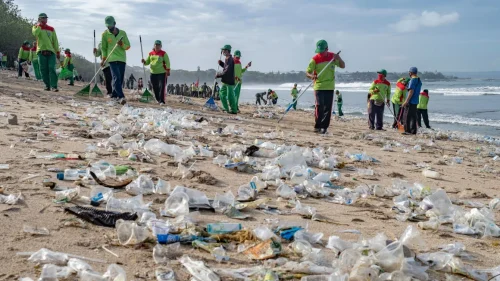Waste Management in the Concept of Integrated Coastal Zone Management (ICZM)

Photo Credit : Falahi Mubrok/Mongabay Indonesia
Coastal areas, with their biodiversity and unique ecosystems, play an important role in ecological balance and also serve as a support for the socio-economic livelihoods of surrounding communities. Economically, coastal areas provide various natural resources that support economic activities such as fishing, tourism, and maritime transportation. From an ecological perspective, coastal ecosystems such as mangroves and coral reefs play a crucial role in maintaining environmental balance and serving as natural barriers against erosion and climate change.
However, on the other hand, the increasing human activities in coastal areas have put pressure on the balance of these ecosystems. One of the environmental problems that frequently arises is the increase in waste volume, both originating from human activities in the coastal areas themselves and brought by ocean currents from other regions.
Waste Issues in Coastal Areas

Photo Credit : Falahi Mubarok/Mongabay Indonesia
Coastal areas, which are transitional zones between terrestrial and marine ecosystems, often face environmental pollution problems, especially due to waste. With the growing population and diversification of human activities, the amount of waste has increased significantly. Improper waste management and disposal in the environment can cause pollution, greatly affecting consumer safety and public health, particularly for communities living in coastal areas.
Waste often originates from tourism activities and is swept away by ocean waves and discarded. Another portion is transported to the sea through rivers and currents from fishing activities in coastal harbors, fishing ports, and urban households. The accumulation of plastic waste in the ocean can have serious and long-term effects, including damage to marine ecosystems, disruption of marine food chains, increased pollution, and harm to marine organisms.
Case Study: Waste Accumulation on the Beach

Photo Credit : Made Nagi/Shutterstock
For example, in early 2021, a waste problem occurred in the Kuta Beach area in Bali. About 30 tons of waste were collected from Kuta Beach during a beach cleaning activity attended by military and police personnel, Scout members, government officials, and the local community of Badung. This indicates that the awareness of proper waste disposal among tourists visiting Kuta Beach, Bali, is still very low.
Scattered plastic waste also has a negative impact on water, soil, sea, and even air. This is because the raw material of plastic, polychlorinated biphenyl (PCB), has a structure similar to that of DDT, and plastic bags are very difficult to decompose in the soil, taking between 100 to 500 years to degrade.
With the potential increase in the population, a significant increase in waste generation can be expected, not only from the population itself but also from waste carried by river flows that will accumulate as it reaches the coast.
To maintain the sustainability of coastal environments, a comprehensive and integrated management approach is needed. One of them is the concept of Integrated Coastal Zone Management (ICZM), which is a holistic strategy that encompasses all aspects of coastal area management, including waste management.
The Government has Made Several Efforts Related to Marine Waste Management, including:
- Placing Nets at River Boundaries: One of the efforts is to install nets at river boundaries. The aim of this initiative is to identify the largest sources of pollution and prevent waste from entering the ocean. These nets serve as filters that prevent waste from rivers from flowing directly into the sea, thus reducing the amount of waste polluting the ocean.
- Installing Trash Booms or Conducting Beach Cleaning: Another effort is to install trash booms or conduct beach cleaning activities. Trash booms are devices used to capture floating waste on the water surface. Meanwhile, beach cleaning activities involve community participation in cleaning up the waste on the beach. Both initiatives aim to address waste that has already reached the sea and educate the public about the importance of maintaining the cleanliness of the ocean.
- Issuing Regulations on Pollution Prevention: The government also plays a vital role in marine waste management by issuing regulations on pollution prevention. These regulations provide a legal basis and preventive measures to protect fishery resources and the environment from waste. They can also encourage communities and industries to take more responsibility in managing their waste.
- Developing an Action Plan for the Month of Ocean Love: In addition, there is an initiative to develop an action plan for the Month of Ocean Love. This initiative aims to promote the participation of various stakeholders in conducting massive and integrated education, campaigns, and beach cleaning actions. By involving various stakeholders, it is hoped that greater awareness of the importance of maintaining ocean cleanliness and reducing marine waste can be created.
Although the government has made sincere efforts to address waste management issues in coastal areas, achieving optimal success requires support from the community, especially considering the increasing population each year. To address this challenge, some expected future efforts include:
- Increasing Public Awareness:
Intensive efforts are needed to raise public awareness about the importance of proper waste management. Through effective educational campaigns, the government and relevant agencies can educate the public about the negative impacts of waste on coastal environments and encourage active participation in waste reduction, separation, and recycling.
- Development of Waste Management Infrastructure:
The government needs to increase investment in the development of waste management infrastructure in coastal areas. This includes establishing waste collection systems, recycling facilities, and waste treatment plants. Adequate infrastructure will enable proper waste disposal and reduce the likelihood of waste ending up in the ocean.
- Strengthening Waste Regulations and Enforcement:
The government should continue to strengthen waste management regulations and enforce them effectively. This includes implementing stricter penalties for illegal dumping and promoting responsible waste disposal practices among individuals, businesses, and industries operating in coastal areas.
- Promoting Sustainable Tourism Practices:
Tourism is a significant contributor to waste generation in coastal areas. Promoting sustainable tourism practices, such as reducing single-use plastics, implementing waste reduction measures in hotels and resorts, and educating tourists about responsible waste disposal, can help minimize waste accumulation in coastal regions.
- Encouraging Community Participation:
Engaging local communities in waste management initiatives is crucial. Community-based programs, such as beach cleaning campaigns and waste management workshops, can empower individuals to take ownership of waste reduction efforts and contribute to maintaining the cleanliness of coastal areas.
- Strengthening International Cooperation:
Marine waste is a global issue that requires international cooperation. Governments can collaborate with neighboring countries and international organizations to address waste management challenges in coastal areas collectively. Sharing best practices, knowledge, and resources can lead to more effective waste management strategies.
Conclusion
Integrated Coastal Zone Management (ICZM) plays a crucial role in addressing waste management issues in coastal areas. By adopting a holistic approach that incorporates waste reduction, recycling, and proper disposal practices, coastal ecosystems can be protected while sustaining the socio-economic benefits they provide. Governments, communities, and stakeholders must work together to raise awareness, strengthen infrastructure, enforce regulations, promote sustainable practices, encourage community participation, and foster international cooperation to achieve effective waste management in coastal areas.


1 Comment
It is perfect time to make some plans for the future and it is time to be
happy. I’ve read this post and if I could I desire to suggest you some interesting things or advice.
Maybe you can write next articles referring to this article.
I want to read more things about it!